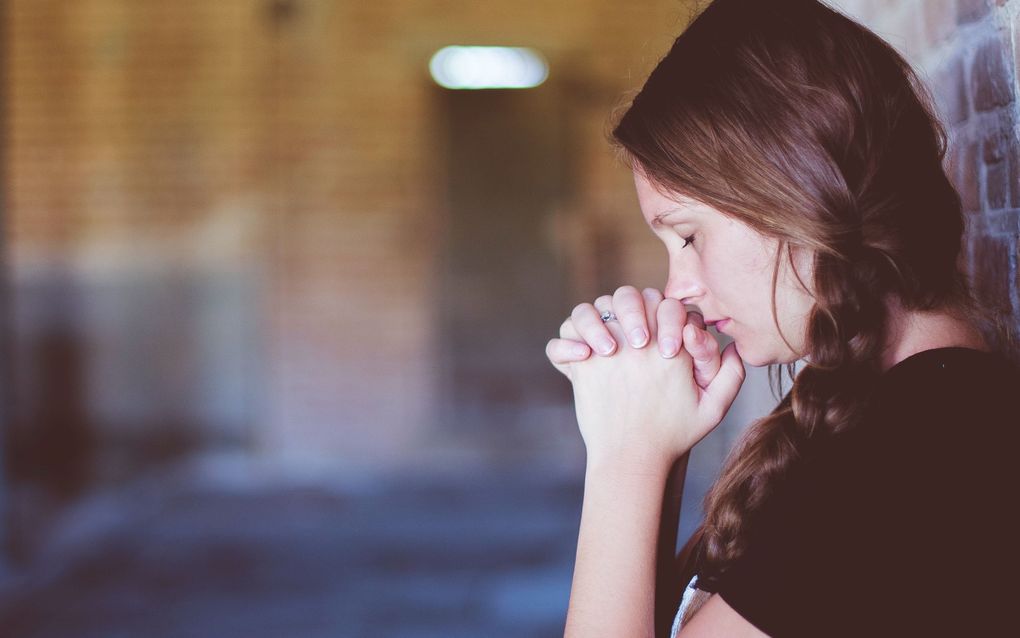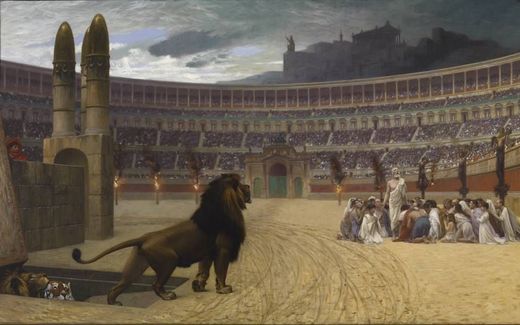Praying with expectation, that’s not easy
14-10-2021
Christian Life
Michiel Bakker, RD

It's important to teach a child praying at a young age. Photo Unsplash
Christian Life
“Prayer is essential. At the same time: it is not easy.” This conviction stimulated the Christian Reformed pastor Anne van Olst to write his book “Praying you can learn”. In this “practical guide to prayer,” he discusses praise, intercession, prayer groups and even a biblical posture during prayer.
In the hall of the Christian Reformed Church in Antwerp, there is a table with Bibles and literature in various languages. The recently published book by Rev. Van Olst, who has been working in the Belgian city since June 2015, is also there. The pastor takes his seat at a table in the bright room, with a view of the church hall.
Praying is not easy, you say. Why not?
“I believe that there is no Christian who will ever get a certificate for prayer. And if someone does, I would not like to congratulate them. You can find joy in prayer, but you run into the same problem of slacking off. Sometimes you run out of words, or your thoughts run wild while praying. It is good to pay attention to this. Exactly, for this reason, the Lord Jesus has said that we should persevere in prayer.”
You call it a “great discovery”, seeing that prayer is answering rather than asking. Why?
“In the past, I thought that praying was mainly my search for God, my question to Him. I often come across this idea at catechism classes and courses. People say: ‘I pray, but do I get anything back? I call out, but does God answer? It is liberating and relaxing and enriching to discover that God is finally answering by the time I start praying. How many times have I kept silent while He spoke? His speaking is there much earlier than our speaking. When we see that praying is not primarily asking but answering, we become small, humble, modest and expectant. We don’t pray in a vacuum; God is first.”

If you want to grow in your prayers, it is crucial to practice praise, you write. How do you do that?
“It is important, as the Lord Jesus teaches us in the Lord’s Prayer, to give praise a place in our prayers. The Bible is full of it. For example, the poet of Psalm 145 says, “Lord, I want to praise You, I want to bless You.” Well, go ahead and do that, you might say. Praise has its own grammar. Say how great the Lord is and how good.
When you begin your prayer with praise, it is not only to the glory of God; it also does something to yourself. Everything that you then ask the Lord for is about living to the glory of God.”
Sometimes, the call sounds to pray daily for one or more persons who do not know God. How do you view that?
“I would certainly do that. The Lord teaches us in 1 Timothy 2 to pray for others. That is never useless. I have to say: if only I believed that more. At the same time, we are faced with a mystery here because we do not know precisely how the Lord incorporates our prayers into His plan.
Praying for your environment also changes you. When you pray on Sunday morning that the Lord will bring new people to church, you warmly welcome someone who suddenly walks in, and you don’t think: What are you doing here? When I pray for my neighbour and then meet him, I look at him with different eyes. A teacher said: If I pray for the most challenging student in the class, something changes. It doesn’t necessarily mean that the person changes, but it does change my irritated attitude towards him.”
A box full of prayers
“If we say ‘please’ more often than ‘thank you’ in our prayers, it is out of balance,” writes the Rev. Van Olst in the chapter “Don’t forget to give thanks”. “Someone told me that for a while she had the habit of writing down all the cares and needs she prayed for on notes and keeping them in a box. This way, she could remember what she had asked God for. Every month she would take the box, empty it and read all the notes that were put in during the month. And what did they reveal each time? Many worries had been taken away; many prayers had been answered. That was a reason to give thanks (...) and it was a reason to thank God for all prayers that were answered. And the prayers that had not yet been answered went back into the box. Each piece of paper became a prayer of thanksgiving or a new prayer. Wonderful, isn’t it?”
What place do you see for prayer groups in the church?
“The Bible gives every reason to ask: What’s the matter if you don’t pray together in the congregation? In the book of Acts, it says that the congregation comes together in prayer. One of the reasons to come together in a prayer circle is that this brings regularity and discipline. Sometimes you don’t make time for prayer, but if it is in your diary and people are waiting for you, you just go. Praying together has often helped me to focus on God for half an hour or an hour. You don’t have to find the words yourself all the time, because others can give them to you.
A prayer group is not the only possibility to pray together. A Bible study group also pays attention to prayer, although sometimes it could be more. And those who point out the common prayer in the Sunday service are of course right. Yet I have noticed that praying together in small groups can also be a blessing.”
Sometimes, there is a fear that praying in groups can easily become one-sided.
“When is a prayer one-sided? When there is only praise or only humbling and no thanksgiving. Or when it is only about intercession. I am not so afraid of that. In a prayer circle, you can complement each other. Moreover: everyone, even a pastor, runs the risk that his prayers become one-sided. That’s why it’s important to talk to each other about prayer.”
“Teach your child to pray at a young age”
“It is good to teach children to pray young,” says Mr Van Olst. “We teach children all kinds of things (being polite, behaving properly) but above all: teach them to pray in their own words from an early age.”
By simply praying as a parent when you preside over the family, you ensure that children can be included, says the pastor. “You can also let them suggest prayer points at an early age. I often lead in prayer at the table, and my wife does too. But there are also meals when we say: Who is next to pray? Our youngest is one year old, and I expect him to say his turn before he is four. Then he can pray, in his own way.”
The pastor also calls the evening prayer a vital moment. “One of our boys is eight years old. Before going to bed, sometimes he prays himself and sometimes I do it. You can also discuss this with each other. Then you say, for example: “When you pray, you always say: Lord Jesus. That is nice, but prayer is also to the eternal God and Father of our Lord Jesus Christ.”
Children sometimes pray the most beautiful things: whether the Lord will give all the homeless a home and make all the poor people rich and whether the Lord Jesus will come back soon. Isn’t that wonderful? Then you can talk about it together. Why do you want the Lord Jesus to come back quickly? That results in beautiful conversations.”
Praying very long in a meeting is “criminal” for all those people who try to pray with you. That sounds harsh!
“It’s mainly a thought-provoking comment, and I deliberately don’t specify what is ‘too long’.” With a smile, “I run the risk of this sentence being considered applicable to myself by my congregation. That is precisely why I have written it down. As a pastor, you have to take the congregation with you in prayer. It is service work. You should not overcharge the congregation. Praying along for fifteen minutes is a huge effort, especially on a hot summer day, with your eyes closed. Your thoughts are easily distracted. Be aware of that when you pray at home, in church or in the classroom.”
How important is our body posture when praying?
“When you think about the posture of prayer, it is striking that we have a custom (closed eyes and folded hands) which is not necessarily wrong, but which does not appear in the Bible. Kneeling is found in the Bible, but our church furniture has no kneeling benches. At home, we might kneel in front of the bed, but apart from that? Do we ever do it as a family or as elders and deacons? Paul was kneeling down with the elders on the beach of Miletus.
I am not advocating change but offering thoughts on how we might consider different prayer positions. I am convinced that a casual attitude will result in careless prayers. If you mark with your posture that your prayer is to the glory of God, it will be a blessing to yourself.”
Bidden kun je leren: Praktische gids voor gebed. By Anne van Olst; Publisher KokBoekencentrum, 160 pages; price € 14,99 (only available in Dutch)
This article was published previously in the Dutch Reformatorisch Dagblad on July 1st, 2021
Related Articles




